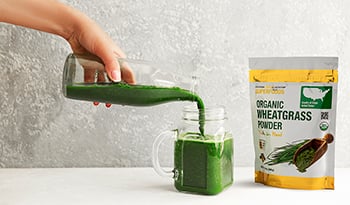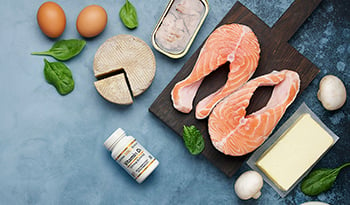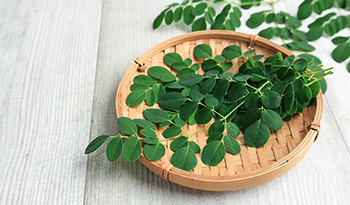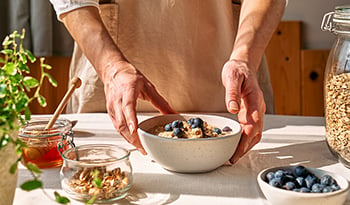Detox Tea: Health Benefits And Effects
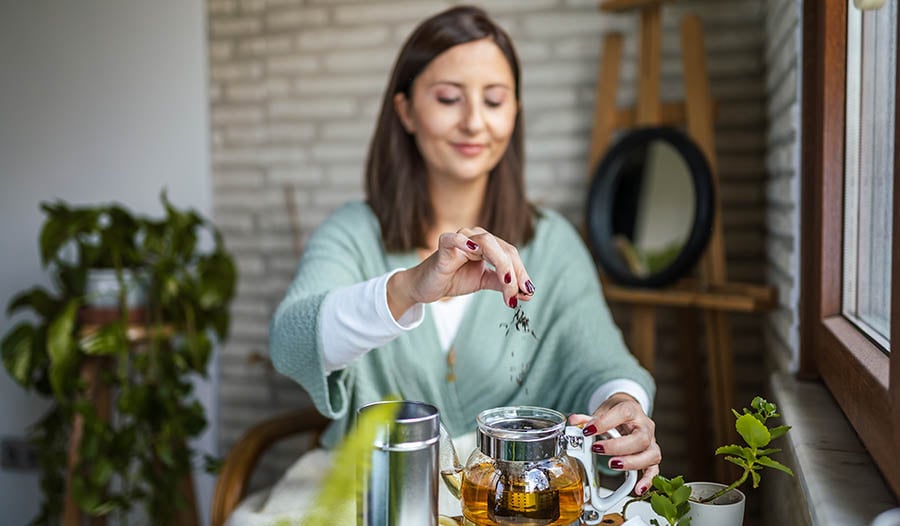
You’ve probably heard about detox programs that involve following intense—sometimes unrealistic—protocols to rid your body of toxins. What if I told you that your body is ALWAYS detoxing? And instead of doing a two-week juice cleanse and fast, you could simply incorporate a detoxifying tea or detoxifying herbs into your daily routine to gently support your body’s natural detox processes?
Detox teas and detoxifying herbs can aid your body’s natural detoxifying processes by supporting digestion, providing antioxidants to improve skin and immune health, and offering a gentle energy boost with caffeine-containing herbs! Read on to learn the health benefits of detox tea and how to incorporate it into your daily routine.
Top Health Benefits Of Detox Tea
Immunity
Many herbs found in detox teas may benefit the immune system by providing antioxidants that support immune function—like vitamin C, zinc, vitamin A, and vitamin E, to name a few. These antioxidants support the immune system by bolstering our natural defense systems against pathogens like viruses, bacteria, and even parasites. They can also reduce harmful free radical formation and oxidative stress, which can increase the risk of disease down the road. Herbs in detox teas that can support immune function include oregano, thyme, ginger, rosehips, and orange peel.
Digestive Benefits
Detox tea may also support digestive function. Digestion and bowel movement efficiency play a large role in our everyday detox. Having healthy bowel movements daily is crucial to ensuring that the toxins we encounter in daily life are removed from the body.
Many herbs found in detox teas help improve digestion by supporting the first, or cephalic, phase of digestion or by supporting bile production. In the cephalic phase of digestion, the body produces salivary and gastric secretions in response to the sight or smell of food or bitter herbs! Bitter herbs not only help stimulate gastric secretions, but they can also support gut motility and help regulate bowel movements! Some of my go-to bitter herbs include burdock, dandelion, and bitter fennel.
Bile is made in the liver and stored in the gallbladder. It has many functions, including removing waste from our bodies. The liver processes various toxins and secretes them into the bile. Bile is then excreted from the body via stool. This is why bowel movements are so important! Herbs like dandelion, beetroot, fenugreek, peppermint, and globe artichoke support bile flow, which, in turn, aids the detox process.
Skincare
Your skin is a mirror of what’s happening inside of you. When optimizing your skincare routine, it’s important to address the skin topically, but also to address what’s going on inside your body. A big part of this is ensuring you are efficiently ridding your body of toxins through hydration and regular bowel movements.
Certain herbs in detox teas can not only help your body remove toxins more efficiently but also contain antioxidants and other nutrients that are beneficial to skin health. Antioxidants help reduce free radicals, unstable molecules that can damage DNA and other cells in the body. When unchecked, free radicals cause oxidative stress, speeding up the aging process.
Environmental pollutants, heavy metals, and ultraviolet (UV) light all lead to oxidative stress. Antioxidants can help protect the skin from oxidative stress and support healthy skin by slowing aging and cellular damage. Green tea is a popular herb found in many detox teas. It is full of catechins, polyphenols that reduce free radical damage by increasing the activity of antioxidants.
Caffeine
If you like a caffeine boost in the morning but don’t necessarily love coffee—or just want a change of pace!—A detox tea with caffeine-containing herbs like green tea or yerba mate could be a nice morning pick-me-up. Green tea and yerba mate contain slightly less caffeine than coffee. So, if you’re looking for a bit of an energy boost with numerous other health benefits, a detox tea might be just what you need!
How To Incorporate Detox Tea Into Your Routine
There are many ways to incorporate detox-supporting herbs into your daily routine. One of the best times to drink detox tea, especially those with caffeine-containing herbs, is in the morning with breakfast. Remember, caffeine on an empty stomach can cause digestive upset, so it’s best to have some food when you drink caffeine!
If your detox tea is caffeine-free and you’re using it to support digestion, try drinking it 15 to 30 minutes before breakfast. This will help kick off the digestive process before you start eating your meal.
You can also brew detox tea at home! Pre-formulated detox teas come in a wide variety and are the easiest way to DIY your detox brew. Most simply require boiling water, pouring the water over one or two tea bags, steeping for five to 10 minutes, and enjoying your tea.
If you’re looking to brew a single herb or want to get creative with a combination of herbs, purchase individual herbs to get formulating! Use one tablespoon of herb per cup of tea. If you want to use three different herbs, use one teaspoon of each to make up a tablespoon.
For example, you could use dandelion root, ginger, and orange peel for a citrus-flavored detox tea. Use one teaspoon of each (or get creative with your quantities, as long as the total equals a tablespoon), mix up the herbs, place them in a tea infuser, and add your boiling water. This is a fun way to try different herbs and experience different flavors!
If you want to mix and match herbs with fruits or veggies you already have on hand, try a tasty blend of green tea with lemon and ginger. You can use your favorite green tea, cut up a quarter-sized amount of ginger root, add a few squeezes of lemon juice, and steep. Lemon has been found to have protective effects on the liver! Other vegetables and fruits that may support healthy detox processes are beets, turmeric root, arugula (and other cruciferous veggies), blueberries, blackberries, and citrus fruits.
Safety Considerations + Possible Side Effects
As with any new addition to your diet or supplement protocol, it’s always best to consult your dietitian or naturopathic doctor to ensure detox tea is safe for you and won’t interact with other medications or herbs you are taking. People with gallbladder disease, such as bile blockage, gallstones, gallbladder inflammation, or constipation, should avoid using detox tea. People who are pregnant or nursing should also avoid detox teas.
Always read the information on the ingredients of any tea formula before consumption. Some teas may include laxative ingredients that could lead to abdominal cramping, diarrhea, and dehydration and should not be consumed daily.
Possible side effects of detox teas that contain caffeine are insomnia, headaches, digestive upset, and increased feelings of anxiety. Other potential side effects of detox teas may include bloating, gas, abdominal cramping, or skin rash.
Drink Detox Tea For Better Health
Detox teas could be a great addition to your daily routine to support immune, digestive, and skin health and give you a gentle energy boost to start your day. You can incorporate detox herbs in the form of pre-formulated herbal teas, individual herbs, or blended with fruits and veggies you already have on hand. Always consult your provider before incorporating any new teas or herbs into your daily routine.
Remember, your body is always detoxing. A detox tea can be a great addition to gently support detox and help you feel great in the process!
References:
- Bendich A. Physiological role of antioxidants in the immune system. J Dairy Sci. 1993;76(9):2789-2794.
- Lobo V, Patil A, Phatak A, Chandra N. Free radicals, antioxidants and functional foods: Impact on human health. Pharmacogn Rev. 2010 Jul;4(8):118-26.
- Chacko SM, Thambi PT, Kuttan R, Nishigaki I. Beneficial effects of green tea: a literature review. Chin Med. 2010 Apr 6;5:13.
- Rezaie P, Bitarafan V, Horowitz M, Feinle-Bisset C. Effects of Bitter Substances on GI Function, Energy Intake and Glycaemia-Do Preclinical Findings Translate to Outcomes in Humans? Nutrients. 2021 Apr 16;13(4):1317.
- Almajid AN, Sugumar K. Physiology, Bile. In: StatPearls. Treasure Island (FL): StatPearls Publishing; September 12, 2022.
- Fan M, Zhang X, Song H, Zhang Y. Dandelion (Taraxacum Genus): A Review of Chemical Constituents and Pharmacological Effects. Molecules. 2023;28(13):5022. Published 2023 Jun 27.
- Kahlon TS, Chapman MH, Smith GE. In vitro binding of bile acids by okra, beets, asparagus, eggplant, turnips, green beans, carrots, and cauliflower. Food Chemistry. 2007;103(2):676–680.
- Reddy RR, Srinivasan K. Effect of dietary fenugreek seeds on biliary proteins that influence nucleation of cholesterol crystals in bile. Steroids. 2011;76(5):455-463.
- Chumpitazi BP, Kearns GL, Shulman RJ. Review article: the physiological effects and safety of peppermint oil and its efficacy in irritable bowel syndrome and other functional disorders. Aliment Pharmacol Ther. 2018;47(6):738-752.
- Addor FAS. Antioxidants in dermatology. An Bras Dermatol. 2017 May-Jun;92(3):356-362.
- Pizzino G, Irrera N, Cucinotta M, Pallio G, Mannino F, Arcoraci V, Squadrito F, Altavilla D, Bitto A. Oxidative Stress: Harms and Benefits for Human Health. Oxid Med Cell Longev. 2017;2017:8416763.
- Zhou T, Zhang YJ, Xu DP, Wang F, Zhou Y, Zheng J, Li Y, Zhang JJ, Li HB. Protective Effects of Lemon Juice on Alcohol-Induced Liver Injury in Mice. Biomed Res Int. 2017;2017:7463571.
- Emamat H, Foroughi F, Eini-Zinab H, Hekmatdoost A. The Effects of Onion Consumption on Prevention of Nonalcoholic Fatty Liver Disease. Indian J Clin Biochem. 2018 Jan;33(1):75-80.
- Soleimani D, Paknahad Z, Rouhani MH. Therapeutic Effects of Garlic on Hepatic Steatosis in Nonalcoholic Fatty Liver Disease Patients: A Randomized Clinical Trial. Diabetes Metab Syndr Obes. 2020;13:2389-2397. Published 2020 Jul 7.
DISCLAIMER:This Wellness Hub does not intend to provide diagnosis...
















































































 Table of Contents
Table of Contents



